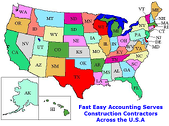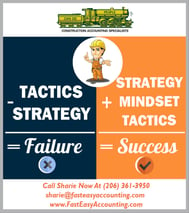
1, No idea at all method
2. Whatever you can afford method
Here you spend spare cash (yes, spare cash may exist!) on marketing. So the marketing is dependent on cash flow. During the good times, you market more, during the bad times you cut the marketing. The danger here is that if the construction business falls, and you cut marketing, then the situation is likely to spiral out of control. How can you climb out of the situation when there is no money for marketing?
3. The percentage of sales method
This is a popular method. Typically, you work out at the start of the year what percentage of sales you want to spend on marketing. For example, if sales last year were $200,000 and you decided to spend 5% of sales on marketing, then you’d have a budget of $10,000 ($200,000 x 5%).
The problem with this method is that you may not need $10,000 worth of marketing to achieve your sales target. What if you can only do so much? If $4,000 spent on marketing creates enough work for you to be flat out, then the other $6,000 is just being wasted. And what percentage should you use?
4. The 'whatever the competition is doing' method
5. The objective and task method
Now, this is the one I recommend. At the start of the year, select the targets you’ll be aiming at over the next 12 months. Work out what you want from each of these targets (such as 100 new clients, or each existing customer to spend another $100, or an increase in the average sale). Then specifically state what you want to do to achieve this, estimating how much it will cost (common sense will give you guidelines, for example, a small service-based business will not be spending $100,000 on TV advertising).
Complete this exercise for each of your targets, then add up all the costs, and this will be your marketing budget for the year. Points to note include:
- Always have a cash reserve for marketing, so you can take advantage of any opportunities that may arise during the year. Remember, not only can you not predict what may happen (for example, some action by your competitors), but the whole point of being in a small business has the flexibility to adapt to market forces.
- Your objectives must be specific so that when you’ve reached them, you can choose to stop any further marketing expenditure if you wish to remove any wastage. Of course, you could continue and look for more growth. The point is, you—not someone else—make that conscious decision to spend your whole budget.
- Conduct a break-even analysis. For example, if you’re spending $1,000 to get 50 new customers to pay, on average, $50, then sales will be $2,500. Will $2,500 in sales generate enough profit to cover the $1,000 spent on marketing?
- You may have several methods that you have used in the past, which you know work. Fine, include them in your plan.
- You may have to spend a certain amount of money to keep your existing clients and maintain market share - make sure this is in your program, and you review the effectiveness of what you’ve always done.
Remember to monitor results
Finally, always have a method of monitoring if your marketing is working or not—otherwise, you’ll fall into the ‘no idea’ category that far too many small business owners belong to. You can’t refine and improve your marketing spend unless you measure the results
About The Author:
![]() Sharie DeHart, QPA is the co-founder of Business Consulting And Accounting in Lynnwood, Washington. She is the leading expert in managing outsourced construction bookkeeping and accounting services companies and cash management accounting for small construction companies across the USA. She encourages Contractors and Construction Company Owners to stay current on their tax obligations and offers insights on how to manage the remaining cash flow to operate and grow their construction company sales and profits so they can put more money in the bank. Call 1-800-361-1770 or sharie@fasteasyaccounting.com
Sharie DeHart, QPA is the co-founder of Business Consulting And Accounting in Lynnwood, Washington. She is the leading expert in managing outsourced construction bookkeeping and accounting services companies and cash management accounting for small construction companies across the USA. She encourages Contractors and Construction Company Owners to stay current on their tax obligations and offers insights on how to manage the remaining cash flow to operate and grow their construction company sales and profits so they can put more money in the bank. Call 1-800-361-1770 or sharie@fasteasyaccounting.com
OUTSOURCED ACCOUNTING FOR
THE BUSY CONTRACTOR
IN A MOBILE ENVIRONMENT

|

|

|

|
Download the Contractors APP today from the App Store or Android Store
Access Code: FEAHEROS
Click here to download the App on Android:
Click here to download the App on iOS:
Simply scan the QR code or search for ‘MyAccountants’ in the App Store and enter the Access code: FEAHEROS to utilize the powerful App features and capabilities, and benefit from having our Construction Accounting App at your fingertips, 24/7."
PS: Even if you are not a Construction Contractor you will find a plenty of benefits in the app so we invite you to download it too! It's Free so why not?





























